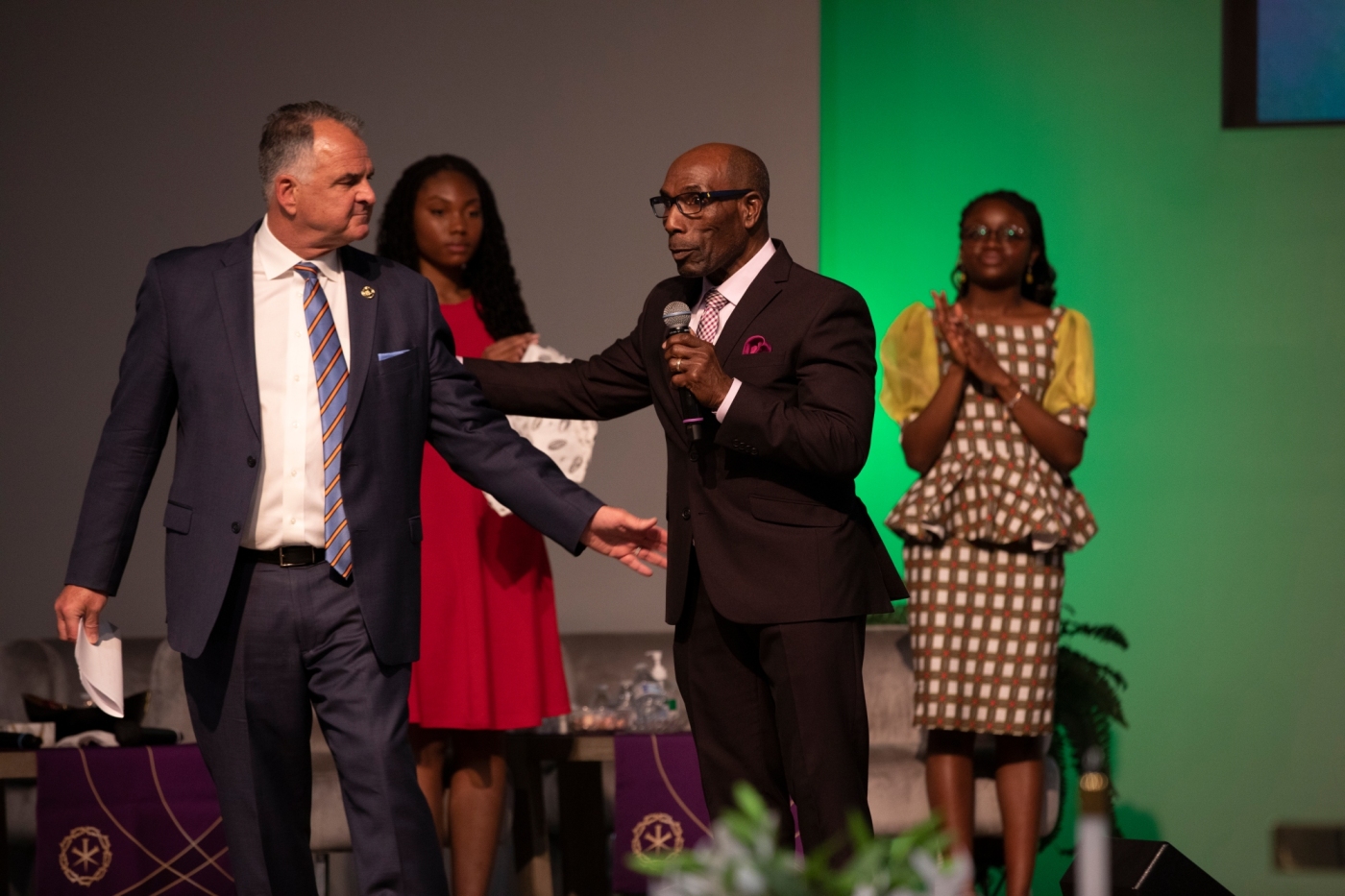Every year during February, campus presidents, administrators, faculty and students with the Cal State University system partner with nearly 100 predominantly African American churches throughout California to share college-related information in order to expand access and opportunities for Black and African American students.
For the ninth year, Cal State University President Fram Virjee attended a Sunday service at an African American Church in Orange County to speak to the congregation about the lengthy list of benefits derived from a college education.
Virjee spoke from the podium at Christ Our Redeemer African Methodist Episcopal Church in Irvine at the invitation of Pastor Ralph E. Williamson as part of the California State University system’s 18th annual Super Sunday event.
“A college degree can unlock life-changing and transformative opportunities for you,” Virjee said. “For you and your family and your community. Cal State Fullerton is here to partner with you every step of the way to make sure you are prepared and that you can afford college and you can succeed at Cal State Fullerton.”
A college degree is a ticket to success, a pathway to prosperity, better-paying jobs and self-fulfillment, the president said.
“It is a pass key to unlock the future that will lift up your life, lift up your family, lift your community,” Virjee said. “It doesn’t matter if you are the first in your family to go to college or returning. There is a place for you.”
By design, Super Sunday always takes place during Black History Month, and Virjee made it a point to talk about CSUF being a forerunner in breaking through some of the barriers African Americans have had to contend with.
In 1981, CSUF became the first major university west of the Mississippi to appoint an African American woman as its president — Jewel Plummer Cobb.
When Plummer Cobb embarked on her educational journey at the University of Michigan, she was not permitted to live in the dorms because of the color of her skin, Virjee said.
But when her educational journey ended at Cal State Fullerton, the university named dorms after her, he said.
Virjee also pointed out CSUF’s stated commitment to equity, diversity and inclusion, and to social justice.
Examples are the university’s Black Student Scholarship Program, African American Resource Center and the offering of an African American Studies degree.
“That is the legacy that we stand on at Cal State Fullerton,” he said. “That is the foundation that we stand on and continue to uphold.”
The president also cited some telling statistics, such as the university’s No.1 ranking in California for graduating women, No.1 ranking in the state for graduating students of color and No.3 ranking in the nation for graduating students of color.
“Your dream of going to college doesn’t just have to be a dream,” he said. “It can be reality. We can make this happen. We will make this happen with you.”
The president also dispelled the myth that college is unaffordable and therefore out of reach to people of lower economic backgrounds. Because of the various forms of grants and other non-loan financial support, 50% of CSUF graduates graduate debt-free, he said.
“Move that financial boulder aside,” Virjee said. “Roll it away.”
Some CSUF staffers and faculty members attended the service to support the cause.
One notable attendee was Natalie J. Graham, the director of the Institute of Black Intellectual Innovation at CSUF and associate professor of African American Studies.
“We recognize at Cal State Fullerton that we can’t make a university that’s great for Black students, faculty and staff if we don’t have meaningful impact in the community,” said Graham, who was named Orange County’s first Poet Laureate in 2021. “Our goal is to not just come on Super Sunday. Any university can do that. We really want to make connections and have an ongoing relationship with folks throughout the community. We want to continue to make it grow.”
Criminal justice professor Gregory C. Brown attended because he felt it was important for the congregation to see a Black male professor teaching in the CSU system.
“I’m sure I look like some of them, and it is important that I represent,” Brown said. “I think it is important that we reach out to our Black churches because it is important for them to know that we love them, and the CSU wants them.”
Related Articles
Parole denied for killer of Cal State Fullerton student Cathy Torrez in 1994
CSUF’s Center for Entrepreneurship: Inspiring investable ‘social innovation’
CSUF professor’s new book explores what makes ‘Uncomfortable Television’ compelling
There’s a dire need for male teachers of color. These men are stepping up
CSUF panelists share experiences with Black empowerment





